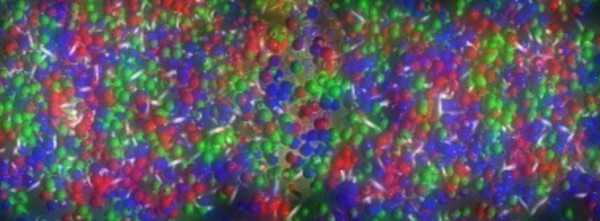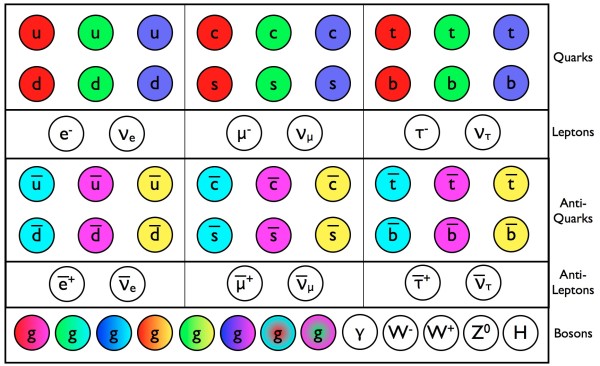“It followed from the special theory of relativity that mass and energy are both but different manifestations of the same thing — a somewhat unfamiliar conception for the average mind.” -Albert Einstein
In physics, we're always on that quest for the next frontier: the next order of magnitude higher in energy, the next order of magnitude closer to absolute zero, the next extra decimal place in our quest towards the speed of light. As far as we've come in terms of pushing the frontiers, we're always striving to go a little bit farther.
 Image credit: RHIC collaboration, Brookhaven, viahttp://www.bnl.gov/newsroom/news.php?a=11403.
Image credit: RHIC collaboration, Brookhaven, viahttp://www.bnl.gov/newsroom/news.php?a=11403.
So when we take stock of what happened in the early Universe -- from the beginning stages of the hot Big Bang -- what did all the known particles (and antiparticles) actually do? Presumably, when things were hot-and-dense enough, they all existed in great abundance.
So what's the story of each of them in the very early Universe? Find out on this week's Ask Ethan!
- Log in to post comments





I read recently that quantum physics suggest there was no "Big Bang" - rather the Universe is temporally endless, without a beginning or end. I like that sort of Zen idea.
Our perceptions are inherently skewed .
Insight by such geniuses as Einstein lead us in the right direction.
Our desire to measure and quantify this universe
is based on our own self imposed beliefs about time.
It is possible that the logical assumptions we make have nothing at all to do with reality.
Our quantification and time ordered thinking came about to measure our own passing.
The universe did not invent time, we did.
It's time to start thinking way outside the box.
Having found the mind-bending Higgs we are chasing the next ephemeral particle. Naturally it is of supreme importants to a world in chaos. Judging by the huge difference the Higgs made to struggling humanity the big find will be even more momentus.
yeah, those people doing things you don't understand and don't see a reason for, what do they think they're doing, huh?
It would be much better spending their time posting scornful prose on a weblog. Amirite?
Thanks Ethan for taking my question. The answer you provided was exactly what I was looking for. Thanks for the followup references for further study. This was without a doubt the most detailed explanation on this topic that I've read in a blog. The list of all the different decays, their sequencing, the re-ionizations, and the timing across adjacent sectors that are cooling at slightly different rates.... just amazing stuff. I'm an accountant/economist by training, and a retired business manager by profession. Cosmology was barely even a word when I went to college back in the 70's. But its still the topic that I spend hours reading about every day. Thanks again!
magnocrat @3,
Why is humanity struggling? The way I see it if everybody receives a decent education and has unfettered access to all the knowledge that experience has bought us humanity would be in a much better place. The currently active scientists are at the tip of the spear when it comes to expanding that knowledge.
I'd like to point out that your TV is not displaying cosmic background radiation, other noise sources are many orders of magnitude higher. There's a low gain antenna, which indiscriminately picks up all environmental noise, coupled with a receiver that has a noise temperature a bit higher than 290K.